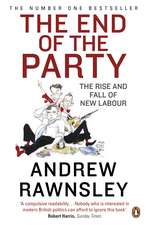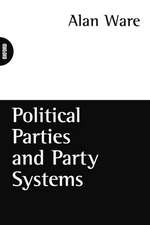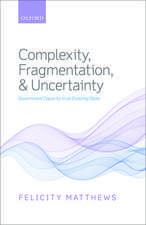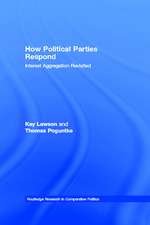Parties, Opposition and Society in West Germany (RLE: German Politics): Routledge Library Editions: German Politics
Autor Eva Kolinskyen Limba Engleză Paperback – 14 oct 2016
| Toate formatele și edițiile | Preț | Express |
|---|---|---|
| Paperback (1) | 272.50 lei 43-57 zile | |
| Taylor & Francis – 14 oct 2016 | 272.50 lei 43-57 zile | |
| Hardback (1) | 823.17 lei 43-57 zile | |
| Taylor & Francis – 12 dec 2014 | 823.17 lei 43-57 zile |
Preț: 272.50 lei
Preț vechi: 326.49 lei
-17% Nou
Puncte Express: 409
Preț estimativ în valută:
52.16€ • 56.68$ • 43.84£
52.16€ • 56.68$ • 43.84£
Carte tipărită la comandă
Livrare economică 21 aprilie-05 mai
Preluare comenzi: 021 569.72.76
Specificații
ISBN-13: 9781138846524
ISBN-10: 113884652X
Pagini: 372
Dimensiuni: 156 x 234 mm
Greutate: 0.45 kg
Ediția:1
Editura: Taylor & Francis
Colecția Routledge
Seria Routledge Library Editions: German Politics
Locul publicării:Oxford, United Kingdom
ISBN-10: 113884652X
Pagini: 372
Dimensiuni: 156 x 234 mm
Greutate: 0.45 kg
Ediția:1
Editura: Taylor & Francis
Colecția Routledge
Seria Routledge Library Editions: German Politics
Locul publicării:Oxford, United Kingdom
Public țintă
General, Postgraduate, Professional, and UndergraduateCuprins
Introduction Part One: Parties and Society 1. Parties and Society in West Germany (I) 2. Parties and Society (II): Changes in Party Support 3. The SPD in Transition: Membership Trends and Party Organization 4. Problems of Party Stability: The FDP 5. The Christian Democrats: Party Organization and Membership Development Part Two: Opposition and Society 6. Youth and Politics 7. Opposition from the Left: Communism, Student Movement, Terrorism 8. Opposition from the Right: Neonazism in West German Society 9. The Green Party: A New Factor in the West German Political Landscape 10. Conclusion Parties, Opposition, and Society - Structures and Trends
Descriere
This book presents an analysis of the social composition of parties inside and outside parliaments to link overall trends of political culture and practice to West German society, its occupational structure, its status levels, and its generation.































